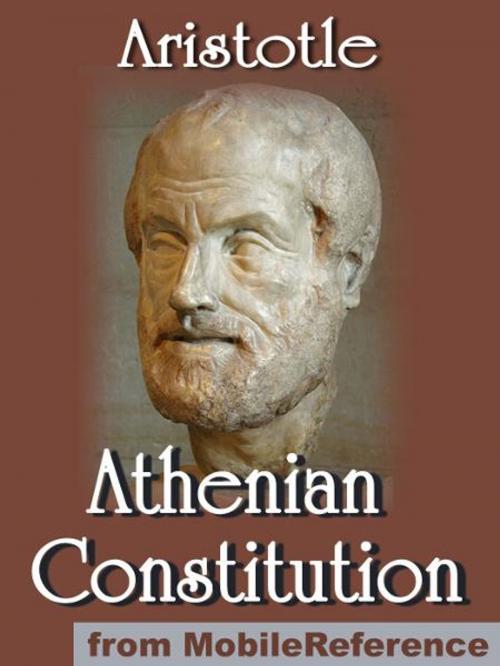Athenian Constitution (Mobi Classics)
Nonfiction, History, Ancient History, Greece, Religion & Spirituality, Philosophy, Political| Author: | Aristotle, Frederic G. Kenyon (Translator) | ISBN: | 9781605017549 |
| Publisher: | MobileReference | Publication: | January 1, 2010 |
| Imprint: | MobileReference | Language: | English |
| Author: | Aristotle, Frederic G. Kenyon (Translator) |
| ISBN: | 9781605017549 |
| Publisher: | MobileReference |
| Publication: | January 1, 2010 |
| Imprint: | MobileReference |
| Language: | English |
The Constitution of the Athenians (or Athenaion Politeia, or The Athenian constitution) is the name of either of two texts from Classical antiquity, one probably by Aristotle or a student of his, the other attributed to Xenophon, but not by him.The Aristotelian text is unique, because it is not a part of the Corpus Aristotelicum. It was lost until two leaves of a papyrus codex carrying part of the text were discovered in Oxyrhynchus, Egypt in 1879 and published in 1880. A second papyrus text was purchased in Egypt by an American missionary in 1890. The British Museum acquired it later that year, and the first edition of it by Frederic G. Kenyon was published in January, 1891. The editions of the Greek text in widest use today are Kenyon's Oxford Classical Text of 1920 and the Teubner edition by Mortimer H. Chambers (1986, second edition 1994).Ancient accounts of Aristotle credit him with 170 Constitutions of various states; it is widely assumed that these were research for the Politics, and that many of them were written or drafted by his students. Athens, however, was a particularly important state, and where Aristotle was living at the time; it is plausible that, even if students did the others, Aristotle did that one himself, and possible that it was intended as a model for the rest. However, a number of prominent scholars doubt that it was written by Aristotle.If it is a genuine writing of Aristotle, then it is of particular significance, because it is the only one of his extant writings that was actually intended for publication.Because it purports to supply us with so much contemporary information previously unknown or unreliable, modern historians have claimed that "the discovery of this treatise constitutes almost a new epoch in Greek historical study." In particular, 21-22, 26.2-4, and 39-40 of the work contain factual information not found in any other extant ancient text.-- Excerpted from Wikipedia, the free encyclopedia.
The Constitution of the Athenians (or Athenaion Politeia, or The Athenian constitution) is the name of either of two texts from Classical antiquity, one probably by Aristotle or a student of his, the other attributed to Xenophon, but not by him.The Aristotelian text is unique, because it is not a part of the Corpus Aristotelicum. It was lost until two leaves of a papyrus codex carrying part of the text were discovered in Oxyrhynchus, Egypt in 1879 and published in 1880. A second papyrus text was purchased in Egypt by an American missionary in 1890. The British Museum acquired it later that year, and the first edition of it by Frederic G. Kenyon was published in January, 1891. The editions of the Greek text in widest use today are Kenyon's Oxford Classical Text of 1920 and the Teubner edition by Mortimer H. Chambers (1986, second edition 1994).Ancient accounts of Aristotle credit him with 170 Constitutions of various states; it is widely assumed that these were research for the Politics, and that many of them were written or drafted by his students. Athens, however, was a particularly important state, and where Aristotle was living at the time; it is plausible that, even if students did the others, Aristotle did that one himself, and possible that it was intended as a model for the rest. However, a number of prominent scholars doubt that it was written by Aristotle.If it is a genuine writing of Aristotle, then it is of particular significance, because it is the only one of his extant writings that was actually intended for publication.Because it purports to supply us with so much contemporary information previously unknown or unreliable, modern historians have claimed that "the discovery of this treatise constitutes almost a new epoch in Greek historical study." In particular, 21-22, 26.2-4, and 39-40 of the work contain factual information not found in any other extant ancient text.-- Excerpted from Wikipedia, the free encyclopedia.















